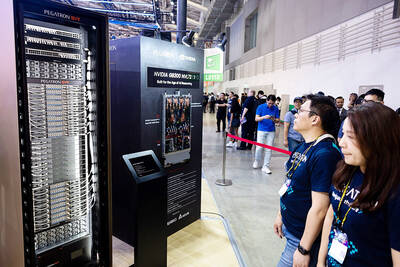Taiwan Cement Corp (台灣水泥), the nation’s leading cement maker, yesterday said it is to launch a new “green” energy development project by the end of this year, as part of its long-term business strategy to drive growth momentum.
“As well as our core [cement] business, we hope that the new project would contribute to the company’s operations over the next three to five years,” company chairman Nelson Chang (張安平) told reporters after the firm’s annual shareholders’ meeting in Taipei.
The firm is particularly interested in wind power, solar energy and geothermal energy, he said, but declined to elaborate.
“We are still assessing the possibility of forming a joint venture for the project, but we must develop our own technologies first,” Chang said, adding that the firm would establish a team of experts from its subsidiary Ho-Ping Power Co (和平電廠).
The chairman yesterday also expressed concerns over the outlook for the local cement industry, saying that Taiwan should strike a balance between the interests of the industry and environmental protection.
Commenting on possible amendments to the Mining Act (礦業法), Chang said that the proposal is “very good” and that the firm’s three quarries have all conducted the required environmental impact assessments.
Amendments to the act would require that all approved mining projects without an assessment pass a supplementary assessment, the Cabinet has said.
Asked if the nation should rely entirely on cement imports, Chang said that the carbon footprint of cement imports must be much more significant than that of cement produced in Taiwan, citing more transportation requirements.
The 70-year-old cement maker has been working on the research and development of carbon capture techniques with the Industrial Technology Research Institute for years in an effort to promote a circular economy and to seek business opportunities.
The technology, which was initially invented to reduce carbon dioxide emissions, can also be used to produce astaxanthin, a key ingredient in high-priced skincare products, company data showed.
Taiwan Cement said it would not begin commercial production of astaxanthin anytime soon, without providing a timetable.
In related news, Taiwan Cement said its ongoing privatization project — which aims to delist one of its major subsidiaries from the Hong Kong Stock Exchange — is expected to complete in August at the earliest.
Incorporated in the Cayman Islands, TCC International Holdings Ltd (TCCI, 台泥國際集團) has cement operations in several southern Chinese provinces.
The proposal, approved by the Investment Commission on Tuesday, still requires approvals from the Hong Kong Exchange and the Cayman Islands Judicial Administration, TCCI managing director Jason Koo (辜公怡) told reporters yesterday.
If the acquisition plan is completed, TCCI would become a fully owned unit of Taiwan Cement and contribute more profit to its parent company, he said.

AI TALENT: No financial details were released about the deal, in which top Groq executives, including its CEO, would join Nvidia to help advance the technology Nvidia Corp has agreed to a licensing deal with artificial intelligence (AI) start-up Groq, furthering its investments in companies connected to the AI boom and gaining the right to add a new type of technology to its products. The world’s largest publicly traded company has paid for the right to use Groq’s technology and is to integrate its chip design into future products. Some of the start-up’s executives are leaving to join Nvidia to help with that effort, the companies said. Groq would continue as an independent company with a new chief executive, it said on Wednesday in a post on its Web

RESPONSE: The Japanese Ministry of Finance might have to intervene in the currency markets should the yen keep weakening toward the 160 level against the US dollar Japan’s chief currency official yesterday sent a warning on recent foreign exchange moves, after the yen weakened against the US dollar following Friday last week’s Bank of Japan (BOJ) decision. “We’re seeing one-directional, sudden moves especially after last week’s monetary policy meeting, so I’m deeply concerned,” Japanese Vice Finance Minister for International Affairs Atsushi Mimura told reporters. “We’d like to take appropriate responses against excessive moves.” The central bank on Friday raised its benchmark interest rate to the highest in 30 years, but Bank of Japan Governor Kazuo Ueda chose to keep his options open rather than bolster the yen,

Even as the US is embarked on a bitter rivalry with China over the deployment of artificial intelligence (AI), Chinese technology is quietly making inroads into the US market. Despite considerable geopolitical tensions, Chinese open-source AI models are winning over a growing number of programmers and companies in the US. These are different from the closed generative AI models that have become household names — ChatGPT-maker OpenAI or Google’s Gemini — whose inner workings are fiercely protected. In contrast, “open” models offered by many Chinese rivals, from Alibaba (阿里巴巴) to DeepSeek (深度求索), allow programmers to customize parts of the software to suit their

Global server shipments are expected to surge to 15 million units next year, from 4 million units this year, with artificial intelligence (AI) servers accounting for about 30 percent, driven by massive capital spending by major cloud service providers, the Market Intelligence and Consulting Institute (MIC) said on Thursday last week. Major cloud service providers — including Google’s parent company Alphabet Inc, Microsoft Corp, Amazon.com Inc and Meta Platforms Inc — are projected to budget US$450 million for capital expenditure next year, up from US$400 million this year, MIC ICT [information and communications technology] Industry Research Center director Edward Lin